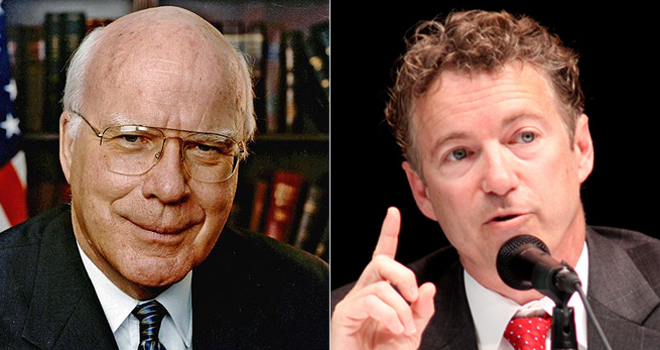Sen. Patrick Leahy (D-VT) and Rand Paul (R-KY) are teaming up to introduce an amendment to the PATRIOT Act that would phase out some of the most controversial components of the national security law.
Senate Majority Leader Sen. Harry Reid (D-NV) and House Speaker John Boehner (R-OH) reached a deal on extending the PATRIOT Act last week, and a procedural vote took place on the floor of the Senate Monday evening.
The motion to debate the PATRIOT Act passed the upper chamber just after 5 p.m. by a vote of 74-8. There will be more debate tomorrow, with a final passage set for Wednesday.
Sen. Jon Tester (D-MT) said on the floor of the Senate that he would vote against the bill “in the name of freedom and privacy.”
The Leahy-Paul amendment introduced by the Kentucky Republican and the Vermont Democrat would have National Security Letters expire on Dec. 31, 2013. It also requires the Justice Department inspector general to audit the issuance of NSL letters and expands public reporting on the use of such letters under the Foreign Intelligence Surveillance Act.
“We were so frightened after 9/11 that we readily gave up these freedoms,” Paul said. “Not only would I let these expire, but I think we should sunset the entire PATRIOT Act.”
“You can be opposed to terrorists … but we can do it with a process that protects the innocent,” Paul said.
After the vote, Sen. Diane Feinstein (D-CA) said that there was a “whole court system set up to protect rights and the grant a warrant.” She said the three expiring provisions were essential to protecting the United States.
Julian Sanchez, a research fellow at the CATO Institute who has closely followed the PATRIOT Act debate, called the Leahy-Paul amendment a “good start,” but said he would prefer some of the standards for NSLs return to the pre-PATRIOT Act standards.
Since Sen. Russ Feingold left the Senate, Paul “has really been one of the most vocal opponents of the wild expansion of the national security and surveillance state” in the Senate, Sanchez told TPM.
Republican members of the House recently met with FBI Director Robert Mueller for a classified briefing — part of an effort to ensure that the GOP doesn’t suffer another embarrassing setback like they did in February when they came up seven votes short on a bill which would have expedited approving the key provisions of the act.
Sanchez said that at this point it “might be awkward” for members who voted against extending the key provisions of the PATRIOT Act to change their vote, but he said leadership is pushing very hard.
“I don’t think there’s much doubt that the reauthorization will pass. Marginal fixes might be able to be produced, but so far there’s been pretty stark opposition to even the most lukewarm sorts of changes,” Sanchez said. “Nobody wants to go into an election year with a national security vulnerability.”
Here’s video of Paul speaking on the floor of the Senate.
[Ed. note: This story has been updated.]






